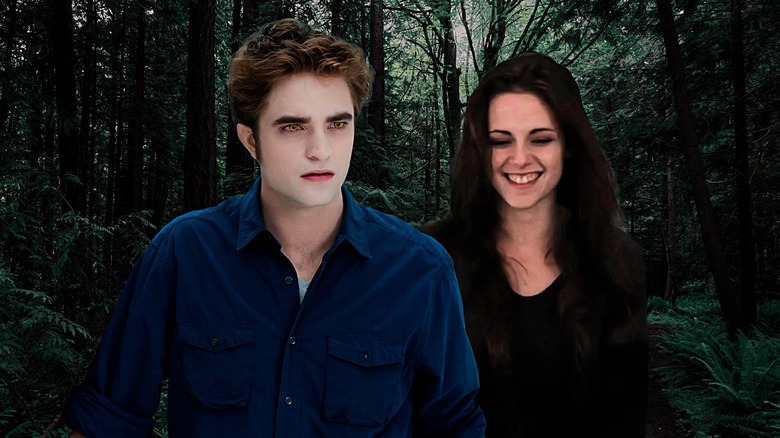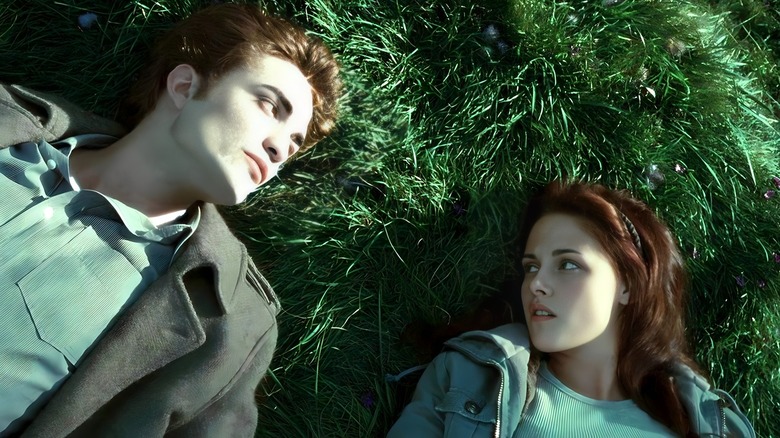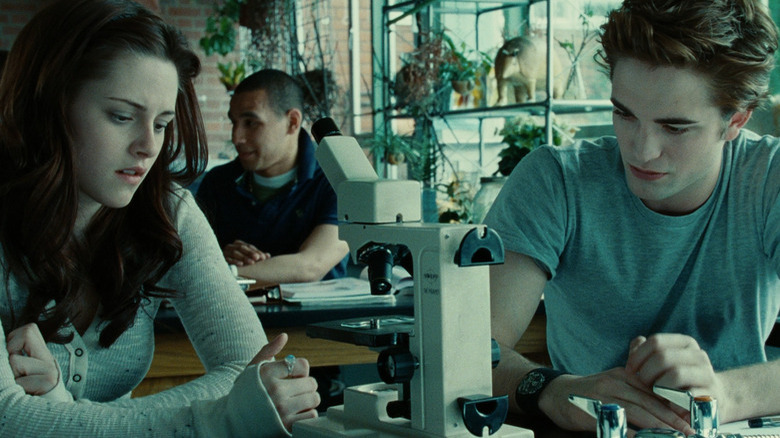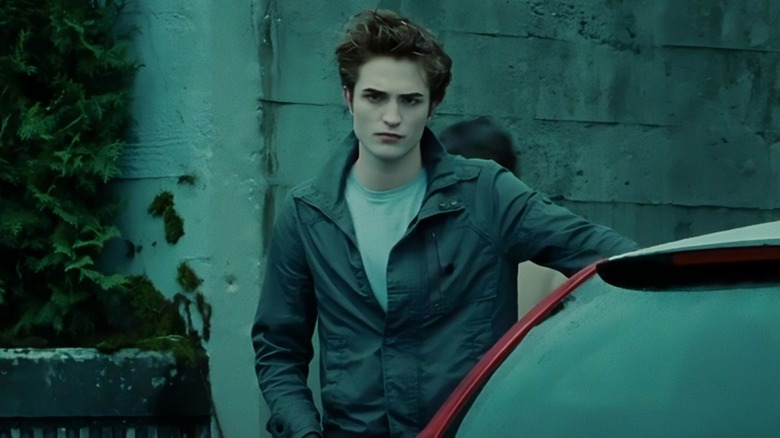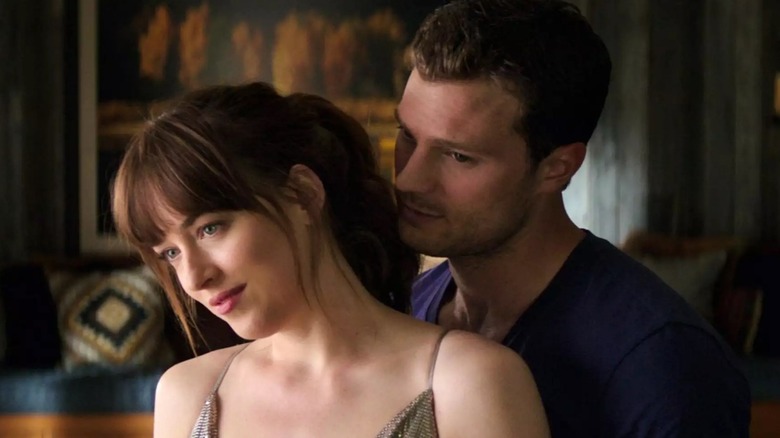Why 'Everyone' Hates Twilight - Is It Justified?
When Stephenie Meyer's debut novel "Twilight" hit bookshelves in 2005, it became a genuine cultural sensation just like "Harry Potter" before it — and a film series followed shortly thereafter that launched it into the pop culture lexicon forever. In 2008, Kristen Stewart and Robert Pattinson, two actors who went on to become some of the most lauded actors of their generation, took on the lead roles of Bella Swan and Edward Cullen, a sullen teenager in a new town who falls in love with a fellow teenager who's actually a vampire. Three books and four movies later, "Twilight" left behind a complicated legacy, which is a nice way of saying that a lot of people really, really hate it.
But why? Culture critic Lindsay Ellis attempted to investigate this in a 2018 YouTube video essay titled "Dear Stephenie Meyer," which was meant to apologize to the author for the way that Ellis herself treated the series during the height of its popularity. As Ellis pointedly puts it, "I am not saying that 'Twilight' deserves to be re-evaluated because it was 'secretly good' the whole time, but rather that the level of virulent bile that came to define it and Meyer herself was actually not in proportion to 'Twilight's' badness, or anything Stephenie Meyer herself did." This is a well-taken point by Ellis, so let's investigate why this might be true. Why exactly does "Twilight" inspire such fury from its harshest critics?
Twilight is pretty campy - but maybe that's the point?
Let's be very honest: "Twilight" is campy, ridiculous, and even downright problematic at points. Bella Swan — in both the books and movies — is a bit of an empty vessel who could be regarded as a stand-in for audience members who want to start up a relationship with a pale, sparkly weirdo who glares at her before saving her life and declaring his undying love. Edward is over a century old when he meets Bella, who is a teenager, so that age difference could certainly be perceived as, well, bad.
The entire series could very well be perceived as a conservative allegory regarding pre-marital intimacy since Bella constantly begs Edward to turn her into a vampire, and he refuses, explaining that they can only even consider the possibility once they're married. They do so as soon as they graduate from high school, and Bella immediately becomes pregnant after being with Edward for the very first time. After their half-human, half-vampire baby is born, Bella's best friend Jacob Black, played on-screen by Taylor Lautner, forms a very strange connection with said baby, which is referred to in-universe as "imprinting" (an attachment formed between a werewolf and the object of their affection that cannot be broken).
Putting those things aside, "Twilight" is, at a baseline level, a heightened and campy fantasy directed at young women who, up until that point, didn't necessarily have a mainstream piece of pop culture that served as fun wish fulfillment. Still, fans and critics have tried to figure out why "Twilight," a somewhat silly and ultimately harmless franchise, is so despised.
Fans and haters alike have tried to solve the mystery that is Twilight
For years, fans have tried to get to the bottom of the hatred against "Twilight." In a Reddit 2020 thread, an admirer of the franchise dove in. As u/ch00se-a_username wrote, "i recently read the ['Twilight'] books, [watched] the movies, etc. and i really love it! however, when i talked to one of my friends about it she went, 'oh, you're one of THOSE people.'" The poster further explained that they weren't quite sure what to make of their friend's comment and while there are some merits and things to like about "Twilight," they don't understand the outright hate.
The conundrum of liking "Twilight" is somewhat apparent within this very comment. Someone read and watched "Twilight" and liked it and then immediately got dunked on when they dared to admit it out loud. A few like-minded people in the comments agreed with the original poster, although one other Redditor, u/ephemeral20, brought up an argument from one of their teachers: "Also my English teacher senior year of High School said that ['Twilight'] is garbage [...] and that 'Twilight' essentially is a story about a teenage girl being unable to live without a guy. So much so, she'd resort to putting herself in dangerous situations. And that it teaches you, you need a guy in your life in order to be happy." As this Redditor points out, they couldn't come up with a valid rebuttal to that point.
While that argument isn't without merit, there's one important thing that hasn't yet been mentioned: good old-fashioned misogyny. As Lindsay Ellis and countless other critics have pointed out in regards to "Twilight," it's meant for teenage girls, and culture meant for teenage girls is nearly always looked at as inferior.
Ultimately, Twilight is targeted towards a specific audience ... and it's one that isn't taken seriously
Yes, "Twilight" is marketed to teenage girls — and perhaps as a result, people who aren't the target audience deeply hate "Twilight." In November of 2011, when the first installment of "The Twilight Saga: Breaking Dawn" was released, noted educator Erika Christakis wrote a piece for Time Magazine entitled "The Harsh Bigotry of Twilight-Haters," positing that male-dominated culture puts down female desire. As Christakis put it,"[People take] 'Twilight' far too seriously, faulting it for leading young girls to mistake fantasy for reality ... It makes you wonder if some people missed the memo that hundreds of millions of females, like their male counterparts, enjoy their fantasy life straight-up weird, sexy, and implausible. Why is it that female fantasies are such a source of derision and fear?"
Melissa Rosenberg, the screenwriter who adapted all of the "Twilight" books into their film counterparts, also had something to say about the hatred directed at the franchise, and she made a salient point during a 2012 interview with Women In Hollywood. "We've seen more than our fair share of bad action movies, bad movies geared toward men or 13-year old boys," Rosenberg said at the time, pointing out that nobody attacks those films like they attacked "Twilight." Not only that, but Rosenberg seemed to echo Christakis' sentiment about female fantasy — and made it more inclusive in the process: "I would argue that it's actually a universal fantasy. Which is, the fantasy being to be loved and cherished for exactly who you are. And that I would say is both male and female, but women are drawn to it."
Twilight can't possibly be worse than the franchise it spawned
At the very least, the most ardent critics of "Twilight" can agree on one thing: the "Fifty Shades" franchise is much, much worse. As many now know at this point, writer E.L. James started writing her first novel "Fifty Shades of Grey" as "Twilight" fanfiction that veered into much more risqué territory than the source material. "Fifty Shades" became yet another massive literary and cinematic sensation, but after the initial height of its fame, it mostly became a punchline.
"Fifty Shades" tells the story of Anastasia Steele (a clear stand-in for Bella Swan played by Dakota Johnson) and her difficult relationship with elusive billionaire Christian Grey (a version of Edward with way more money played by Jamie Dornan), whose bond is tested by ... very different factors than the ones that affect Edward and Bella, to put it delicately. Still, the "Fifty Shades" books and films don't really have any defenders, because the quality isn't there and the message is far more toxic.
Perhaps because everyone can agree that the "Fifty Shades" franchise just isn't very good, it's received way less vitriol and hate than "Twilight" did in its heyday, becoming more of a meme than an object of derision. It's a little wild to realize that, in the end, a series about sparkly vampires inspired more rage than erotic fanfiction based on said sparkly vampires.
